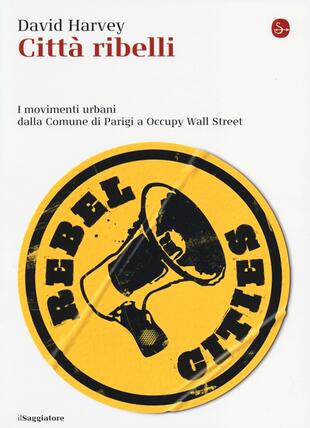

Città ribelli. I movimenti urbani dalla Comune di Parigi a Occupy Wall Street
Acquistalo
Sinossi
Un secolo e mezzo prima che Occupy riempisse le strade e le piazze del mondo, la città moderna era già fucina di idee rivoluzionarie, e fu dallo spazio urbano che soffiarono i primi venti del cambiamento sociale e politico. Da sempre le città sono teatri che mettono in scena il pensiero utopico, ma anche centri di accumulazione capitalistica, e quindi spazi di conflitto contro quei pochi che, controllando l'accesso alle risorse comuni, determinano la qualità della vita di molti. L'urbanizzazione ha giocato un ruolo primario nell'assorbimento del surplus di capitale, alimentando processi di "distruzione creatrice" che hanno sottratto alle masse il diritto di costruire e ricostruire le proprie città. Questo conflitto latente è esploso periodicamente in grandi rivolte popolari, come nella Comune di Parigi del 1871, a seguito della riconfigurazione urbanistica voluta da Napoleone III e realizzata da Haussmann, quando i cittadini espropriati si sollevarono per imporre il governo rivoluzionario sulla capitale. O come nel 1968, con i grandi movimenti sociali urbani che agitarono Chicago e Berlino, Praga e Città del Messico, o ancora, nell'estate 2011, con i riots che hanno bruciato le periferie di Londra e con l'ondata di indignazione contro il potere finanziario che ha scosso America ed Europa. "Città ribelli" ripercorre la storia delle città come centri propulsori della lotta di classe e dei movimenti di riappropriazione dei diritti collettivi.
- ISBN:
- Casa Editrice:
- Pagine: 212
- Data di uscita: 12-09-2013
Recensioni
سرمایهدار، یا باید همه ارزش اضافی حاصل از سرمایهگذاریاش را صرف تفریح و خوشگذرانی کند، که در اینصورت دیگر سرمایهدار نیست، یا اینکه باید بخشی از آن را مجددا سرمایهگذاری نماید. البته برای بسیاری از سرمایهدارها، آنقدر ارزش اضافی تولید میشود که به هر دو هدف فوق برسد، اما الزامات رقابت و گردش سرمای Leggi tutto
I began this book with a different idea of its content. The book has a deep philosophical context on the sense of property, and the city's land use. It is a very interesting read as you can follow how several parts of the city have lost their identity because of the non/regulated acquisition of land Leggi tutto
See David Harvey do beautiful and practical things with Marxist theory! For me, this book was a real coming-together of scattered bits of thought that have been gathering for some time now, about rent-as-debt, cultural production as a force in gentrification, and organizing around living issues (hous Leggi tutto
الكتاب هام في نقطة، وصعب أيضاً في نقطة أخرى أهمية الكتاب هو شرحه لمسألة التطوير العمراني وأفكار الحضرنة التي أصبحت تسيطر على الدول في العصر الحالي سواء كانت نامية أو متقدمة، وكيف أن تلك الآلية هي ثغرة النظام الرأسمالي في الوقت التي تشكل مظهراً على قوته، ويحاول الكاتب أيضاً أن يعيد قراءة جديدة للصراع Leggi tutto
أعتقد أن أغلب المواطنين يرغبون بشدة في أن يعيشوا في مدينة مصممة علي أهوائهم ، يختارون كل شيء من علاقات إجتماعية ، لأساليب حياتية ، لنمط عام شامل . حيث أن المدينة تعتبر هي العالم الأصغر لكل إنسان و المكان الذي يتعين عليه العيش من خلاله . هذا ما يحاول ديفيد هارفي شرحه من خلال هذا الكتاب ، فهو يقدم في Leggi tutto
This is a must read for anyone vaguely interested in the macroscopic roots of urbanization process and its interplay with local struggles. The following review will only touch briefly, on a minority of the points raised by Harvey. But content aside, I find the arguments made by Harvey as clearly exp Leggi tutto
David Harvey is the kind of academic figure that movement really needs I think, one of the most prestigious and well-known geographers in the world who has been writing for decades about capitalism and how we can fight it. Unlike many academics however, he remains much more open to new ideas, to cha Leggi tutto
Citazioni
Al momento non ci sono citazioni, inserisci tu la prima!























